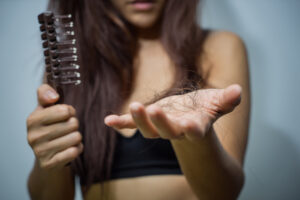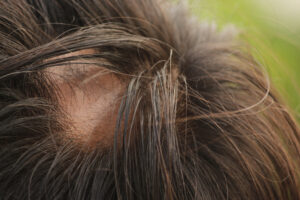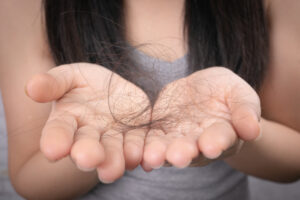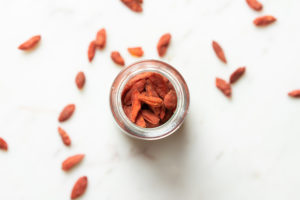HAIR LOSS & WHAT TO DO ABOUT IT
According To Eastern Medicine

Hair issues are the worst – and not just for women. If you’ve noticed your hair thinning or getting patchy, it may cause panic. Our hair is such a big part of our identity that even small changes can make a big impact on our confidence.
However, have you ever wondered if your hair’s condition is a way that your body is attempting to get your attention? While many in the West see hair issues as a problem to quickly cover up with the latest hair care product, thousands of years of Eastern medicine shows us that pausing, watching, and learning what our hair is telling us can go great lengths to helping us learn what is happening in the rest of our bodies.
By looking to the East, Westerners are beginning to learn more about how the hair is a key indicator to how our body is doing – and can often give insight into potential issues that should be addressed. Let’s take a look at some of the ways your hair is telling you how your body is actually doing right this moment!
Hair Loss & TCM
 While there are many issues that can be related to hair – dandruff, thinning, greying, etc. – hair loss is one of the most alarming. One night you go to bed with a healthy head of hair, and the next morning your shower is full of loose threads!
While there are many issues that can be related to hair – dandruff, thinning, greying, etc. – hair loss is one of the most alarming. One night you go to bed with a healthy head of hair, and the next morning your shower is full of loose threads!
In Traditional Chinese Medicine, Hair loss is typically divided into two main types: sudden hair loss (alopecia) and gradual hair loss (thinning hair). In the world of eastern TCM, these issues have unique names such as glossy scalp wind (yóu fēng 油风), ghost shaved head (gǔi tì tóu 鬼剃頭), and the ever fun to say yet horrifying to have moth-eaten hair baldness (fā zhù tuō fà 发蛀脱发).
While hair loss can often be blamed on aging or a reaction to medicines, there may be underlying issues that can be causing your hair thinning or loss.
Early TCM practitioner and guru Zhu Renkang noted that hair loss was divided between four main issues: Blood heat generating wind, Qi and Blood deficiency, Liver and Kidney deficiency, and Blood stasis.
By understanding each – and how the underlying problems manifest into hair problems – you can begin to take steps to increase your hair health with holistic TCM diet and wellness changes.
Patchy or Missing Hair? Consider Biota
 If you have begun to notice that your hair is beginning to think or shed in certain spots, then your body may be having trouble producing the necessary nutrients required to keep your hair, skin, and other vital organs healthy.
If you have begun to notice that your hair is beginning to think or shed in certain spots, then your body may be having trouble producing the necessary nutrients required to keep your hair, skin, and other vital organs healthy.
TCM practitioners will often turn to Biota, an herb that is added to the daily diet of those struggling to grow strong and healthy hair. The Biota herb is known to help decrease blood heat – a traditional eastern medicinal diagnosis that accounts for the hair follicle’s difficulty to produce and grow consistent hair across the scalp.
Biota is also used to treat dandruff and scalp itch, which can also be related to your body’s lack of creation of nutrients necessary to keep your skin moist and vibrant. Other herbs for treating patchy hair and other body issues in tandem are Cuscuta, white peony, Rehmannia, Szechuan lovage and Chinese licorice.
Gradual or Sudden Hair Loss? You May Have Hot Blood
 Individuals who find that they are constantly feeling irritable, angry, or frustrated can often find their issues lead back to an excess of what TCM refers to as blood heat. High blood heat can cause sudden hair loss and scalp dandruff and itch.
Individuals who find that they are constantly feeling irritable, angry, or frustrated can often find their issues lead back to an excess of what TCM refers to as blood heat. High blood heat can cause sudden hair loss and scalp dandruff and itch.
In many instances, high blood heat can be blamed on a diet that is rich in sweet and fatty food. This causes the body’s spleen and stomach to have difficulty digesting and transporting nutrients throughout the body. Known as damp-heat, steam rises within the body, causing the scalp to feel greasy, sticky, and can lead to hair losing the ability to remain rooted in place in the scalp.
For damp-heat and high blood heat, TCM practitioners encourage a treatment that adds foods and drinks to the body that can reduce body dampness and clear the blood’s heat. The addition of dietary supplements such as sheng di huang, dang gui, long dan cao, huang qin, chi ling, ze xie, che qian zi, and liu yi san can be beneficial to restoring your body’s qi and bringing health back to your hair.
Easy TCM Tips For A Healthy Body & Hair
 Are you looking for helpful tips for ensuring that both your body and hair are healthy and vibrant? Consider the following quick tips for increasing your body and hair health from the inside out.
Are you looking for helpful tips for ensuring that both your body and hair are healthy and vibrant? Consider the following quick tips for increasing your body and hair health from the inside out.
- Try to keep up a healthy lifestyle that includes a normal diet, regular exercise, and the amounts of sleep that are recommended by a health professional.
- Seek the help of a hair professional for scalp massages and acupuncture services. These can increase blood circulation at your head and ensure that your scalp is able to produce and grow healthy hair.
- Reset your gallbladder and liver with the proper amount of dietary detox and consistent rest.
- Avoid going to bed with wet hair.
- Encourage a healthy spleen by eating less cold, fried, sweet or oily food.
- Heat foods that are good for reducing blood heat, such as wolfberries (AKA Goji), red dates (AKA Jujube), dried longan, Angelica Sinensis (当归), and Rehmannia glutinosa (熟地黄).
- Nourish the kidney with foods such as black beans, black sesame, mulberry and blackberry to reduce greying.
- Add TCM-approved Chinese herbs to your daily diet that are great for kidney health, such as wolfberries, walnut, mulberry, Fructus Ligustri Lucidi (女贞子), Eclipta prostrate (旱莲草), and Polygonum multiflorum (制何首乌).
Newer
What Your Pee Can Tell You About Your Health According To TCM
Older
5 Natural Sleep Remedies From Eastern Medicine
Comments (0)
Leave a reply
You must be logged in to post a comment.




